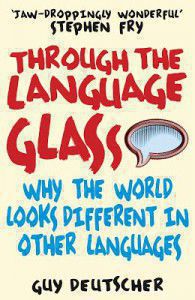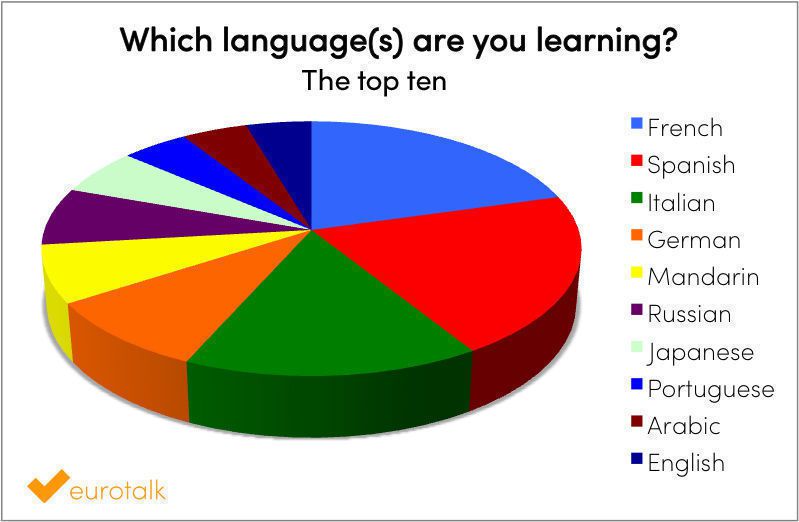Book review: Through the Language Glass
Ever wondered what us language geeks do for fun in our spare time? Reading books about languages, of course! Well, not all the time – but I recently read the very interesting Through the Language Glass by Guy Deutscher, and would recommend it to anyone else who is interested in how different languages work, and how our mother tongue affects our thoughts and behaviour.
 Through the Language Glass is all about the ongoing linguistic debate about whether our native language affects our perception and the way we think about the world around us. A large portion of the book is dedicated to a rather in-depth discussion about the differences between colour vocabulary in various languages. You might already know that Russian and Italian have two words for ‘blue’ (light and dark blue). But you might not know that the famous Greek writer Homer didn’t have any words for blue, and instead used mostly red and black to describe the scenes of the Iliad. This led to a long debate about whether people in the past lacked our modern ‘colour sense’ and saw the world in only a few shades. You’d probably have to be pretty dedicated to trying to understand the evolving debate on the development of linguistic terms for colours to plough through this rather long section, but it is rather interesting if you’ve got the patience.
Through the Language Glass is all about the ongoing linguistic debate about whether our native language affects our perception and the way we think about the world around us. A large portion of the book is dedicated to a rather in-depth discussion about the differences between colour vocabulary in various languages. You might already know that Russian and Italian have two words for ‘blue’ (light and dark blue). But you might not know that the famous Greek writer Homer didn’t have any words for blue, and instead used mostly red and black to describe the scenes of the Iliad. This led to a long debate about whether people in the past lacked our modern ‘colour sense’ and saw the world in only a few shades. You’d probably have to be pretty dedicated to trying to understand the evolving debate on the development of linguistic terms for colours to plough through this rather long section, but it is rather interesting if you’ve got the patience.
The rest of the book moves on to some interesting discussions of smaller tribal languages in Australia and elsewhere, and how their unique features either reflect the requirements of the society/location, or affect the behaviour of the speakers. For example, the Aboriginal language Guuguu Yimithirr has no words for left and right. Instead, speakers must develop an acute sense of North, South, East and West, as it’s impossible for them to say ‘the tree is on my left’ – instead they must say ‘the tree is North of me’. Experiments have shown that even if speakers of the language are driven to new locations blindfolded, they retain their incredible sense of direction and can still describe location based on the compass directions.
And how about grammatical gender? For us English speakers, referring to a table as ‘she’, as a Spanish speaker would (la mesa), or a girl as ‘it’, as a German would (das Maedchen), seems rather odd. But for most Europeans, using a blanket ‘it’ for everything doesn’t really feel right either. So what does this mean for all those speakers of languages with grammatical gender? Do they somehow see a table as girly and feminine, and a phone (el teléfono in Spanish) as macho and masculine? Well of course not… that would be silly! But there may be subtle ways in which these distinctions affect us. Think about how we can tell a story in English being vague about the gender of the person involved. Yesterday, I had dinner with my friend. Whether that friend is male or female is none of your business! But in Spanish, you’re rather forced to disclose that ‘la amiga’ was of course a girl.
We might find the idea of a ‘gender’ for inanimate objects strange and funny, but Deutscher traces this back to at least an original logical starting point. It might surprise you to know that there are many more genders in language, beyond the masculine, feminine and neutral genders you might already know. Some languages even have a ‘vegetable’ gender, which even includes things like aeroplanes. Why, you might ask? Well, it’s simple really. The ‘vegetable’ gender may have started off for only plants. This would have included wood, and anything made from wood, such as a boat, perhaps. It’s then not such a jump to having other vehicles in the same gender.
If any of this sounds intriguing and you’d like to know more, I recommend that you pick up Deutscher’s book. It’s not quite beach reading, but it’s accessibly written, not an academic tome that’s only for linguists. I can guarantee that you’ll learn something new about languages and maybe gain a different perspective on how your native language affects your perception.
Alex
Which language are you learning? The results!
We had a great response to our recent language learning survey; thank you to everyone who took the time to complete it. First things first: we’re delighted to announce that the winner of the iPad mini prize draw is Konstantia Sakellariou. Congratulations, Konstantia – your iPad is on its way!
We wanted also to share a few of our findings with you. Some of the results from the survey were as we expected, others were quite surprising. Here are just a few of the things you had to tell us. Thanks again for all your thoughtful responses, we’ll put them to good use.
Which language(s) are you learning (or would like to learn)?
The first question was pretty straightforward. A couple of people ticked every language on offer (over 100) – now that’s what we call ambition! – but most chose between 1 and 5. Here are the top ten most popular languages:  Other popular choices included Greek, Swedish, Dutch, Brazilian Portuguese, Norwegian, Irish, Polish and Icelandic. We also got some requests for languages we don’t yet offer, like Guernésiais and Twi – we’ll do our best to add those languages to our list, so watch this space!
Other popular choices included Greek, Swedish, Dutch, Brazilian Portuguese, Norwegian, Irish, Polish and Icelandic. We also got some requests for languages we don’t yet offer, like Guernésiais and Twi – we’ll do our best to add those languages to our list, so watch this space!
Why are you learning a language?
Next, we wanted to know why you’re learning a language. Nearly half of the respondents chose travel as a reason, and almost as many said they were learning a language just for fun. 36% of respondents said it was for family reasons or for a relationship, and 27% for work. The results were quite evenly split though, showing that there’s no one overwhelming reason – everyone has their own motivation.  Among the other reasons, we had a range of answers, including an interest in the culture of the language, personal challenge and wanting to follow literature, film and music in other languages. Many people are living in another country, which was their main motivation for learning the local language. And one person said that their heart asked for the knowledge, which we loved 🙂
Among the other reasons, we had a range of answers, including an interest in the culture of the language, personal challenge and wanting to follow literature, film and music in other languages. Many people are living in another country, which was their main motivation for learning the local language. And one person said that their heart asked for the knowledge, which we loved 🙂
What prevents you from learning a language?
We were also interested to know what stops people from learning a language, so we asked you to rate the following reasons out of 5. The most common barrier to learning is a lack of time, followed by not having found the right method, and then the cost involved.  Incidentally, if you’re facing any of these barriers, you may like to check out our recent posts, on finding time to learn a language and learning on a budget. And if you’re looking for resources, did you know you can try out the EuroTalk learning method for free? Either visit our website, or download our free app, uTalk for iOS, to give it a go. We believe learning a language should be fun, because our research shows we learn much better if we’re enjoying ourselves, and this in turn makes it a lot easier to overcome the obstacles that get in the way. See what you think! Other answers included not having an opportunity to use the language, a lack of motivation and difficulty finding resources for the particular language they wanted to learn (we may be able to help there – we’ve got 136 languages and counting…).
Incidentally, if you’re facing any of these barriers, you may like to check out our recent posts, on finding time to learn a language and learning on a budget. And if you’re looking for resources, did you know you can try out the EuroTalk learning method for free? Either visit our website, or download our free app, uTalk for iOS, to give it a go. We believe learning a language should be fun, because our research shows we learn much better if we’re enjoying ourselves, and this in turn makes it a lot easier to overcome the obstacles that get in the way. See what you think! Other answers included not having an opportunity to use the language, a lack of motivation and difficulty finding resources for the particular language they wanted to learn (we may be able to help there – we’ve got 136 languages and counting…).
How have you used your language when travelling?
Finally, we asked how knowing another language has been useful when you’re travelling. There was no clear winner here, which just goes to show knowing a language is always useful! But the top response was that it gives you the ability to talk to locals in their own language; many people added that they felt more welcome as a result and that it gave them independence so they could make the most of their trip. There were lots of practical reasons too, with getting around and eating out narrowly beating shopping in the poll. If you missed out on the survey this time, don’t worry – we’re planning another one soon, so keep an eye on the blog (you can subscribe by email above to get the latest updates), or follow us on Facebook or Twitter. And if you didn’t answer this survey but would still like to have your say on any of the questions, you’re very welcome to email us or add your thoughts in the comments below.
If you missed out on the survey this time, don’t worry – we’re planning another one soon, so keep an eye on the blog (you can subscribe by email above to get the latest updates), or follow us on Facebook or Twitter. And if you didn’t answer this survey but would still like to have your say on any of the questions, you’re very welcome to email us or add your thoughts in the comments below.
Liz
Data above based on 877 survey responses.
Translation mistakes – not just for laughs
Today we have a guest post from language company, thebigword, on famous translation mistakes, some of which had serious consequences. Mistakes are common, and to be expected, when you’re learning a language – but when it really matters, it’s important to get it right!
Over the years there have been many translation ‘slip ups’ and faux pas, and whilst the mistakes may seem funny some can have a far more serious impact. Reputable language solution agencies such as thebigword, specialise in international translation and you can bet your bottom dollar that they wouldn’t be caught making slip ups like the following.
There have been many incidences over the years where mis-translation can go from highly amusing to potentially life damaging. For example, Mead Johnson Nutritionals in 2003 had a case raised against them when 4.6 million cans of baby food had to be recalled. The translation error, which was caused by effectively being lazy, meant that the prescribed recipe translated into Spanish could have caused massive health issues, according to the U.S. Food and Drug Administration.
 Businesses and the world financial markets have also paid the price at the hands of poor translation, most notably when the price of the U.S. dollar was sent spiralling after an incorrect translation of an article by Guan Xiangdong for the China News Service. Guan’s original piece was meant to be a speculative overview of a series of financial reports, but instead it was translated in a more aggressive tone, which ultimately made readers in the U.S. think it was an authoritative warning and they should move their money and sell shares.
Businesses and the world financial markets have also paid the price at the hands of poor translation, most notably when the price of the U.S. dollar was sent spiralling after an incorrect translation of an article by Guan Xiangdong for the China News Service. Guan’s original piece was meant to be a speculative overview of a series of financial reports, but instead it was translated in a more aggressive tone, which ultimately made readers in the U.S. think it was an authoritative warning and they should move their money and sell shares.
The Chicago Tribune published a highly shareable article not that long ago when it collated a series of images captured by tourists on their worldly travels. Examples from China included, ‘man toilet’ and ‘The government decides to cracking down fakes intensively for another three years’. However, our favourite has to be, ‘Because there is the situation when a step is bad, please be careful’. We’re pretty positive that was meant to say ‘mind your step’.
Of course, no faux pas goes unnoticed in the world of marketing, where language on billboards or even newspaper advertising isn’t missed by the most ardent observer.
The popular Dairy Association campaign, ‘Got Milk?’, raised an eyebrow or two when in Mexico it was translated to ‘Are you lactating?’ And in France, Colgate produced a new range of toothpaste called Cue; little did anyone realise that it had the same name as a well-known adult magazine. Now that is what we call a faux pas!
Do you have any favourite translation errors? Please share them in the comments below.
Goal! around the world [Infographic]
Sometimes one word is all you need… With the World Cup getting underway today, here’s how each national team says that all-important word, ‘goal’.
You can find this and lots more in our language learning app, uTalk – available to download and start learning right now from the App Store. So whether you’re watching the football at home or away, you’ll always be prepared.
(There are lots of non-football related words in there too, for those of us with other interests!)
Please do share the infographic with friends and tell us how you’ll be shouting ‘Goal!’ this World Cup 🙂
Embed This Image On Your Site (copy code below):


